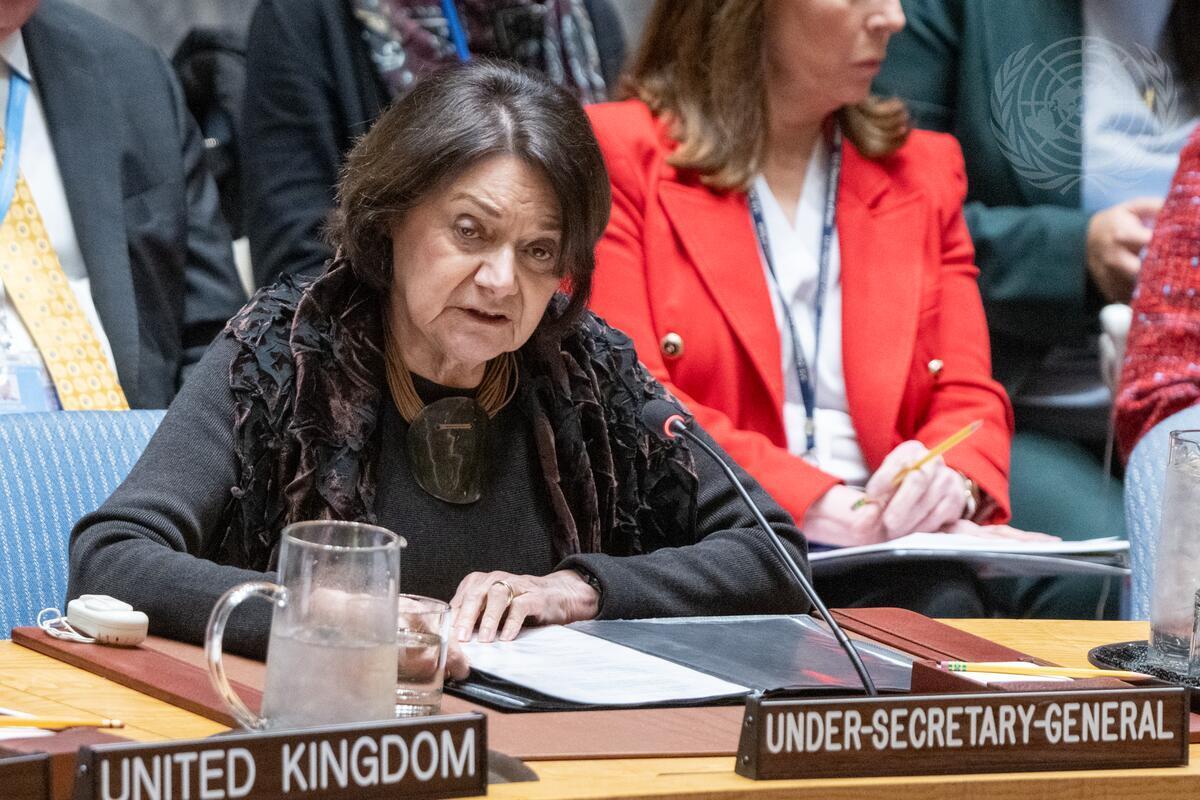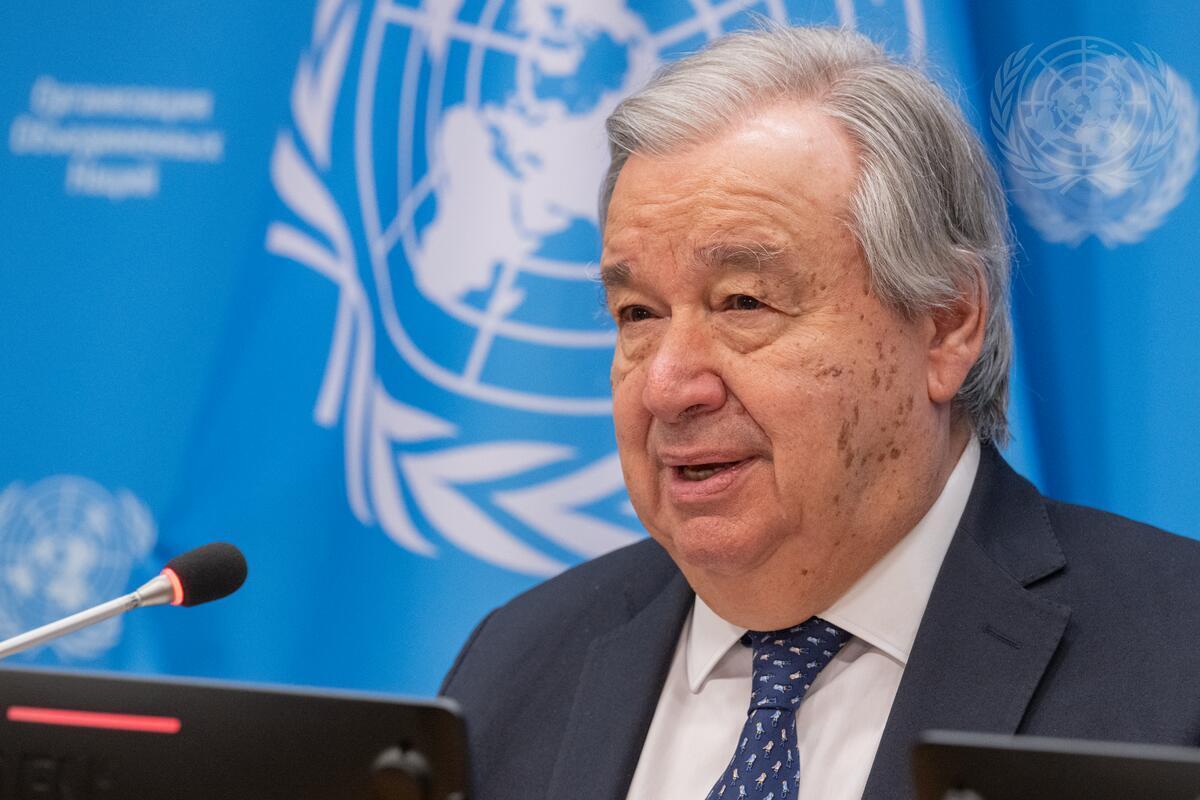Madam President,
Members of the Security Council,
I devote my regular briefing on the situation in the Middle East to the twenty-fourth report on the implementation of Security Council Resolution 2334 (2016). The Secretary-General’s written report that you have already received covers the period between 21 September to 7 December 2022.
Before turning to developments subsequent to the written report, I would like to reiterate my deep concern over the high levels of violence we have witnessed in the occupied West Bank, including East Jerusalem, and in Israel over the last several months.
Clashes, protests, attacks, Israeli security operations, including in Area A, and settler-related violence have continued. In 2022 to date, over one hundred and fifty Palestinians and more than twenty Israelis have been killed in the West Bank and Israel, the highest numbers of fatalities in years.
Regrettably, in the period following the submission of the written report, violence has continued throughout the OPT.
Since 8 December, six Palestinians, including two children, have been killed by Israeli security forces. Of these, four were killed during search and arrest operations in Jenin; one during an exchange of fire following an alleged shooting attack near Ofra settlement; and one was killed in the context of alleged stone-throwing
Madam President,
I will now turn to several observations concerning the implementation of the provisions of Security Council Resolution 2334 (2016) during the reporting period.
Israeli settlement expansion in the occupied West Bank, including East Jerusalem, remains deeply concerning. Settlements constitute a flagrant violation of United Nations resolutions and international law. They undermine the prospects of achieving a two-State solution by systematically eroding the possibility of establishing a contiguous, independent, viable and sovereign Palestinian State.
While the reporting period saw no advancements of housing units in the occupied West Bank, including East Jerusalem, the total number of settlement housing units advanced in 2022 remains high, albeit slightly lower than in 2021. Overall, during the year, in Area C some 4,800 units were advanced, compared with some 5,400 in 2021, while tenders dropped from 1,800 in 2021 to 150 in 2022. Moreover, in occupied East Jerusalem, the number of housing units advanced more than tripled from the previous year – from some 900 units in 2021 to some 3,100 units in 2022, with tenders doubling from 200 to 400.
I call on the Government of Israel to cease the advancement of all settlement activities immediately.
I also remain deeply concerned by the continued demolitions and seizures of Palestinian structures. I am alarmed, in particular, by the demolition of a donor-funded school in Masafer Yatta and the stated intention of Israeli authorities to demolish additional structures in the herding communities of that area, which would have a significant humanitarian toll, if implemented.
I call upon the Government of Israel to end the demolition of Palestinian-owned property, prevent the possible displacement and eviction of Palestinians, in line with its obligations under international humanitarian and international human rights law, and approve plans that would enable Palestinians to build legally and address their development needs.
Madam President,
I am gravely concerned by the sharp increase in violence against civilians on both sides, which exacerbates mistrust and undermines a peaceful resolution to the conflict.
I am particularly appalled that children continue to be victims of violence. 2022 has tragically witnessed the killing of 44 Palestinian children and one Israeli child. These include the killing by Israeli security forces of a 16-year-old boy in the context of alleged stone-throwing in Aboud community, near Ramallah, on 8 December, and of a 15-year-old Palestinian girl in the context of a search and arrest operation in Jenin on 11 December that involved an exchange of fire between Israeli security forces and Palestinians. According to an initial IDF investigation, the girl was shot unintentionally and was not involved in hostilities. Children must never be the target of violence, used, or put in harm’s way.
Also disturbing are the continued killings of Palestinians by Israeli security forces in incidents where they did not appear to present an imminent threat to life.
I reiterate that security forces must exercise maximum restraint and use lethal force only when it is strictly unavoidable in order to protect life.
The increase in the number of Israelis killed or injured by Palestinians, including in bombings and shooting attacks is also alarming.
The violence must stop and all perpetrators must be held accountable. I condemn all acts of terrorism, which must be rejected and condemned by all. I call on political, religious and community leaders on all sides to help calm the situation, avoid spreading inflammatory rhetoric and speak up against those seeking to incite and escalate the situation.
Madam President,
I am increasingly concerned by the fragility of the current political and security dynamics, particularly in the occupied West Bank, including East Jerusalem. The deepening occupation, the increase in violence, including terrorism, and the absence of a political horizon have empowered extremists and are eroding hope among Palestinians and Israelis, alike, that a resolution of the conflict is achievable.
Simultaneously, the Palestinian Authority is facing mounting economic and institutional challenges, compounded by the constraints of the occupation, the absence of serious reforms and unclear prospects for donor support.
In Gaza, the situation remains fragile, and the risk of escalation persists. Efforts by the United Nations and regional and international partners, including Egypt and the State of Qatar, to improve Palestinian lives, as well as measures by Israel to ease some movement and access restrictions and facilitate more economic activity, have enabled the ceasefire to hold. There are currently more than 18,000 permits for Palestinian residents of Gaza to work or do business in Israel, the highest number since 2007. The volume of goods exiting Gaza via Kerem Shalom crossing with Israel increased by nearly fifty per cent in 2022. While progress has been made, restrictions and delays continue to negatively affect humanitarian and development efforts as well as important sectors of the economy.
More needs to be done to alleviate the humanitarian situation and enable the economy to grow. Ultimately, solving Gaza’s challenges will require political solutions, including a return of the legitimate Palestinian Government to the Strip, a full lifting of Israeli closures, in line with UN Security Council resolution 1860 (2009) and an end to the militant buildup.
As commodity prices spike, humanitarian needs and costs are rising across the OPT. The World Food Programme, in particular, is facing a significant decline in bilateral financial support, putting at risk its ability to maintain critical food and cash assistance to more than 400,000 of the most vulnerable food-insecure people across the OPT. The World Food Programme needs USD 35 million over the next six months to be able to continue its ongoing support.
I also remain seriously concerned about the financial situation of UNRWA, which is putting at risk the delivery of essential services to Palestine refugees in the Occupied Palestinian Territory and in the region. As the West Bank witnesses the highest level of violence in years, UNRWA remains one of the most significant stabilizing elements in the lives of thousands of Palestinians. I reiterate my urgent call to provide UNRWA with the funds needed to fully deliver on its General Assembly mandate.
Madam President,
As I told the Council in my briefing last month, seeking to freeze this conflict or manage it in perpetuity are not viable options. There is no substitute for a legitimate political process that will resolve the core issues driving the conflict.
In line with the recommendations that I made to this Council in November, I urge the parties, along with regional States and the broader international community to take concrete steps that will change the negative trajectory on the ground and have an immediate impact on Palestinian and Israeli lives, while, at the same time, ensuring these steps are anchored in a political framework that moves the parties forward towards the establishment of two States.
The United Nations remains actively engaged in advancing these efforts with all relevant parties and is committed to supporting Palestinians and Israelis to resolve the conflict and end the occupation. The United Nations is committed to achieving a two-State solution, in line with relevant United Nations resolutions, international law and bilateral agreements.
Thank you.






